古希腊哲学(英文)
Diogenes的英文介绍PPT

Diogenes made a virtue of poverty. He
begged for a living and slept in a tub(浴盆;
桶)in the marketplace. He became notorious
[nəu'tɔ:riəs](臭名昭著的)for
his
philosophical stunts such as carrying a lamp
contrast to and commentary on contemporary Athenian
behaviors. This attitude was grounded in a disdain[dis'dein] (鄙视) for what he regarded as the folly['fɔli] (愚蠢), pretense[pri'tens](虚假), vanity['vænəti] (虚荣心), self-deception['selfdi'sepʃən](自欺), and artificiality[ɑ:tifiʃi'æləti] (不自然) of human conduct.
In Athens
Diogenes arrived in Athens with a slave named Manes who abandoned him shortly thereafter. With characteristic humour, Diogenes dismissed his ill fortune by saying, "If Manes can live without Diogenes, why not Diogenes without Manes['meini:z](摩尼波斯预言家 )?” Diogenes would mock such a relation of extreme dependency. He found the figure of a master who could do nothing for himself contemptibly [kən'temptəbli](卑鄙 地;下贱地)helpless. He was attracted by the ascetic [ə'setik](苦行的;禁欲主义的)teaching of Antisthenes[æn'tisθəni:z] (安提西尼), a student of Socrates,
Ancient Greek Philosophy古代希腊哲学
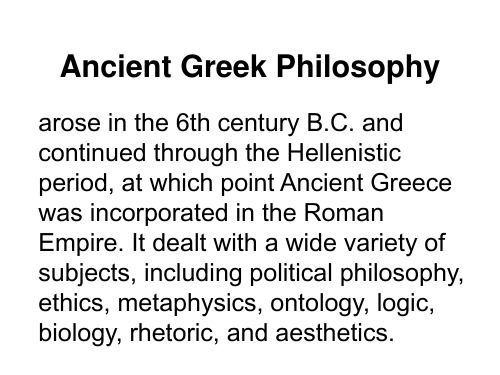
B. Socrates
abandoned the study of natural science and turned to the study of human life. Some constituents of Socrates’ philosophy:
1)Belief in absolute knowledge Socrates’ contribution to philosophy was essentially ethical in character, concepts such as justice, love, virtue, and self-knowledge were the basis of his teachings. 2)Socratic method (he replaced “spoon-feeding” method with “dialogue”.) The dialogical method of enquiry known as the Socratic method or dialectical method, is Socrates’ most important contribution to western thought.
Plato’s theory of government
Plato’s Republic represents an ideal state toward which actual states (imperfect societies ) should strive. Tripartite division of the soul: reason, desire or appetite, passions The Three Classes of the Republic: rulers, auxiliaries, citizens Four “cardinal virtues” of the Republic :wisdom, courage, self-discipline, justice.
希腊文明哲学篇

中期希腊哲学家
苏格拉底(Socrates) (469/70-399 B.C.)著名的古希 腊的思想家、哲学家,教育家,他和他的学生柏拉 图,以及柏拉图的学生亚里士多德被并称为“古希 腊三贤”,更被后人广泛认为是西方哲学的奠基者。 身为雅典的公民,据记载苏格拉底最后被雅典法庭 以引进新的神和腐蚀雅典青年思想之罪名判处死刑。 尽管他曾获得逃亡雅典的机会,但苏格拉底仍选择 饮下毒堇汁而死,因为他认为逃亡只会进一步破坏 雅典法律的权威,同时也是因为担心他逃亡后雅典 将再没有好的导师可以教育人们了。
柏拉图
亚里士多德(Aristoteles)
(384/3-322/1 B.C.)-----吾爱吾师,吾尤爱真理,古希腊 斯吉塔拉人,世界古代史上最伟大的哲学家、科学家和教育 家之一。 亚里士多德首先是个伟大的哲学家,他虽然是柏拉图的学生, 但却抛弃了他的老师所持的唯心主义观点。柏拉图认为理念 是实物的原型,它不依赖于实物而独立存在。亚里士多德则 认为世界乃是由各种本身的形式与质料和谐一致的事物所组 成的。“质料”是事物组成的材料,“形式”则是每一件事 物的个别特征。就像是现在有一只鼓翅乱飞的鸡,这只鸡的 “形式”是它会鼓翅、会咕咕叫、会下蛋等。当这只鸡死时, “形式”也就不再存在,唯一剩下的就是鸡的物质。柏拉图 断言感觉不可能是真实知识的源泉。亚里士多德却认为知识 起源于感觉。这些思想已经包含了一些唯物主义的因素。亚 里士多德和柏拉图一样,
他们虽然各执一辞,但都认为它是物质 的,而且相信它只有一个。在这个决定的过 程中用的不是科学或实验的方法,而是慎思 明辨的理性,是直观到宇宙的同一。他们都 飞越了经验观察所能指证的范围,但同时不 以神话的假设为满足,而要寻求一个真正的 同一原理,找出变化的原质。他们对“万物 是一”及“原质(不管是水、气或火)”的 肯定,是由理性或思想所指导的,而非仅仅 出自想像或神话,因此被称为欧洲的第一批 哲学家。
哲学作业
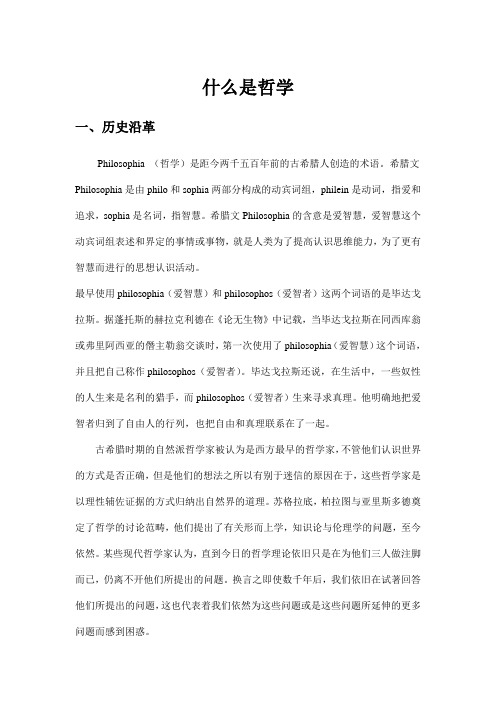
什么是哲学一、历史沿革Philosophia (哲学)是距今两千五百年前的古希腊人创造的术语。
希腊文Philosophia是由philo和sophia两部分构成的动宾词组,philein是动词,指爱和追求,sophia是名词,指智慧。
希腊文Philosophia的含意是爱智慧,爱智慧这个动宾词组表述和界定的事情或事物,就是人类为了提高认识思维能力,为了更有智慧而进行的思想认识活动。
最早使用philosophia(爱智慧)和philosophos(爱智者)这两个词语的是毕达戈拉斯。
据蓬托斯的赫拉克利德在《论无生物》中记载,当毕达戈拉斯在同西库翁或弗里阿西亚的僭主勒翁交谈时,第一次使用了philosophia(爱智慧)这个词语,并且把自己称作philosophos(爱智者)。
毕达戈拉斯还说,在生活中,一些奴性的人生来是名利的猎手,而philosophos(爱智者)生来寻求真理。
他明确地把爱智者归到了自由人的行列,也把自由和真理联系在了一起。
古希腊时期的自然派哲学家被认为是西方最早的哲学家,不管他们认识世界的方式是否正确,但是他们的想法之所以有别于迷信的原因在于,这些哲学家是以理性辅佐证据的方式归纳出自然界的道理。
苏格拉底,柏拉图与亚里斯多德奠定了哲学的讨论范畴,他们提出了有关形而上学,知识论与伦理学的问题,至今依然。
某些现代哲学家认为,直到今日的哲学理论依旧只是在为他们三人做注脚而已,仍离不开他们所提出的问题。
换言之即使数千年后,我们依旧在试著回答他们所提出的问题,这也代表着我们依然为这些问题或是这些问题所延伸的更多问题而感到困惑。
“哲”一词在中国起源很早,历史久远。
如“孔门十哲”,“古圣先哲”等词,“哲”或“哲人”,专指那些善于思辨,学问精深者,即西方近似“哲学家”,“思想家”之谓。
一般认为中国哲学起源东周时期,以孔子的儒家、老子的道家、墨子的墨家及晚期的法家为代表。
而实际上在之前的《易经》当中,已经开始讨论哲学问题。
西方哲学史英语
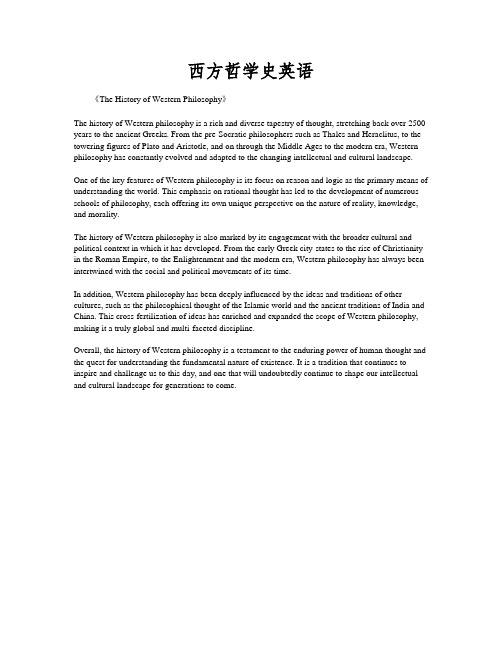
西方哲学史英语《The History of Western Philosophy》The history of Western philosophy is a rich and diverse tapestry of thought, stretching back over 2500 years to the ancient Greeks. From the pre-Socratic philosophers such as Thales and Heraclitus, to the towering figures of Plato and Aristotle, and on through the Middle Ages to the modern era, Western philosophy has constantly evolved and adapted to the changing intellectual and cultural landscape.One of the key features of Western philosophy is its focus on reason and logic as the primary means of understanding the world. This emphasis on rational thought has led to the development of numerous schools of philosophy, each offering its own unique perspective on the nature of reality, knowledge, and morality.The history of Western philosophy is also marked by its engagement with the broader cultural and political context in which it has developed. From the early Greek city-states to the rise of Christianity in the Roman Empire, to the Enlightenment and the modern era, Western philosophy has always been intertwined with the social and political movements of its time.In addition, Western philosophy has been deeply influenced by the ideas and traditions of other cultures, such as the philosophical thought of the Islamic world and the ancient traditions of India and China. This cross-fertilization of ideas has enriched and expanded the scope of Western philosophy, making it a truly global and multi-faceted discipline.Overall, the history of Western philosophy is a testament to the enduring power of human thought and the quest for understanding the fundamental nature of existence. It is a tradition that continues to inspire and challenge us to this day, and one that will undoubtedly continue to shape our intellectual and cultural landscape for generations to come.。
西方哲学史名词解释
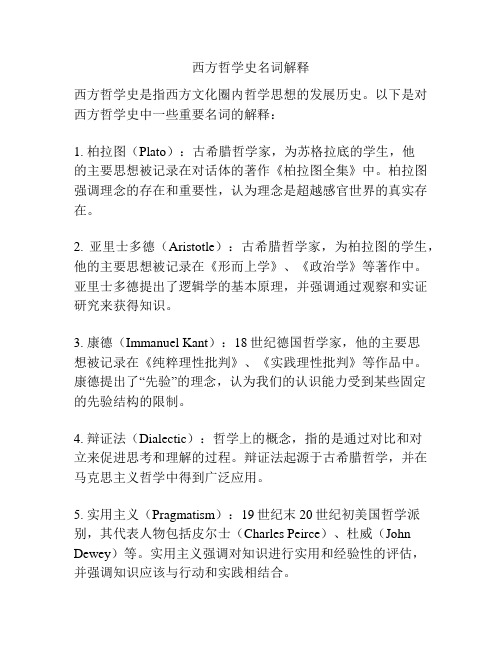
西方哲学史名词解释西方哲学史是指西方文化圈内哲学思想的发展历史。
以下是对西方哲学史中一些重要名词的解释:1. 柏拉图(Plato):古希腊哲学家,为苏格拉底的学生,他的主要思想被记录在对话体的著作《柏拉图全集》中。
柏拉图强调理念的存在和重要性,认为理念是超越感官世界的真实存在。
2. 亚里士多德(Aristotle):古希腊哲学家,为柏拉图的学生,他的主要思想被记录在《形而上学》、《政治学》等著作中。
亚里士多德提出了逻辑学的基本原理,并强调通过观察和实证研究来获得知识。
3. 康德(Immanuel Kant):18世纪德国哲学家,他的主要思想被记录在《纯粹理性批判》、《实践理性批判》等作品中。
康德提出了“先验”的理念,认为我们的认识能力受到某些固定的先验结构的限制。
4. 辩证法(Dialectic):哲学上的概念,指的是通过对比和对立来促进思考和理解的过程。
辩证法起源于古希腊哲学,并在马克思主义哲学中得到广泛应用。
5. 实用主义(Pragmatism):19世纪末20世纪初美国哲学派别,其代表人物包括皮尔士(Charles Peirce)、杜威(John Dewey)等。
实用主义强调对知识进行实用和经验性的评估,并强调知识应该与行动和实践相结合。
6. 身心二元论(Cartesian Dualism):文艺复兴时期哲学家笛卡尔(René Descartes)提出的观点,认为心灵和身体是两种不同的实体。
身心二元论影响了后来的哲学和心理学发展,并成为关于心灵和身体关系的重要议题。
7. 马克思主义(Marxism):以卡尔·马克思(Karl Marx)和弗里德里希·恩格斯(Friedrich Engels)为代表的思想体系。
这一思想体系基于对资本主义社会的批判,认为社会和历史的发展是由阶级斗争驱动的。
以上是对西方哲学史中一些重要名词的简要解释。
在学习西方哲学史时,了解这些名词的含义能够帮助我们更好地理解西方哲学思想的发展和演变。
古希腊三大哲学家英语介绍
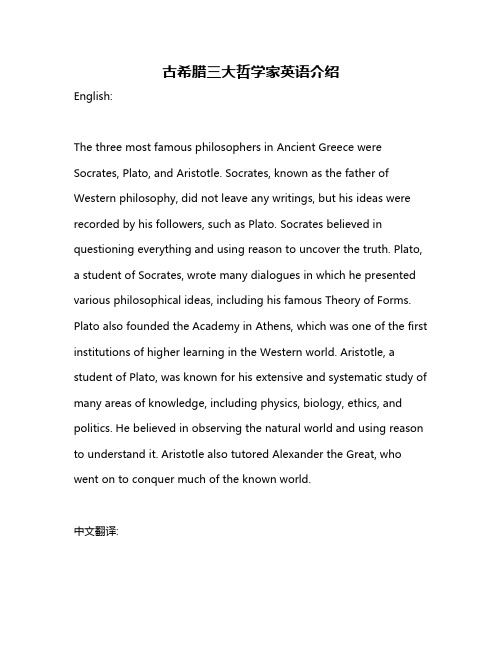
古希腊三大哲学家英语介绍English:The three most famous philosophers in Ancient Greece were Socrates, Plato, and Aristotle. Socrates, known as the father of Western philosophy, did not leave any writings, but his ideas were recorded by his followers, such as Plato. Socrates believed in questioning everything and using reason to uncover the truth. Plato, a student of Socrates, wrote many dialogues in which he presented various philosophical ideas, including his famous Theory of Forms. Plato also founded the Academy in Athens, which was one of the first institutions of higher learning in the Western world. Aristotle, a student of Plato, was known for his extensive and systematic study of many areas of knowledge, including physics, biology, ethics, and politics. He believed in observing the natural world and using reason to understand it. Aristotle also tutored Alexander the Great, who went on to conquer much of the known world.中文翻译:古希腊最著名的三位哲学家是苏格拉底、柏拉图和亚里士多德。
03 古希腊哲学

古希腊哲学
Jaspers:Axial Age 一、早期自然哲学 1、arche:基质、原则 2、四种立场
二、“哲学转向” 1, 智者 2, Socrates的道德哲学与精神助产术 3, Plato的理念论 4, Aristotle:一个为西方文明奠定广泛基 础同时又对西方文明的继续发展造成巨 大理论障碍的人。
三、晚期希腊哲学 老学派:学园派、逍遥派 新学派:伊壁鸠鲁派、斯多亚派、怀疑派 、新柏拉图主义 特点:伦理化倾向。哲学的主要目标不再 是追求智慧,而是追求幸福。
参考书目
赵敦华:《西方哲学简史》,北京大学 出版社,2001。 (古希腊)柏拉图著,郭斌和、张竹明 译录》,吉林人民出版社,2003。
- 1、下载文档前请自行甄别文档内容的完整性,平台不提供额外的编辑、内容补充、找答案等附加服务。
- 2、"仅部分预览"的文档,不可在线预览部分如存在完整性等问题,可反馈申请退款(可完整预览的文档不适用该条件!)。
- 3、如文档侵犯您的权益,请联系客服反馈,我们会尽快为您处理(人工客服工作时间:9:00-18:30)。
• The Academy • Mathematics • What is the real
nature of things?
What makes this a Chair?
Chairness
Plato
• The Republic
– Ideal society – Rule by the philosophers – The Allegory of the Cave
the physical as well as from the purely intellectual
Aristotle
• Aristotelian Scientific Method
– Used for 2000 years – Basic assumptions based on reasoning
• Disturbs nature
Aristotle
• Four Causal Questions (Physics)
– Material Question (What is it made of?) – Efficient Question (What caused it?) – Formal Question (What is its Form or
• Ethics
Act to avoid extremes
Thank You
Classical Greek Philosophy
Zeno
Alexander Xenophon
Eschines Socrates
Alcibiades
Plato Aristotle
Epicurus Averroes
Parmenides Hypatia
• Taken to trial (Apology) • Convicted—he did not put on a
defense • Sentenced to death • Drank hemlock
purpose as a creature of God
Aristotle
• Motion
– Bodies move to achieve their stable ("natural") position
– Heavier bodies fall faster
• Poetics
• Rhetoric
– Ethos = power of persuasion created by the character of the speaker (Gettysburg Address)
– Pathos = power of persuastion created by the passion of the speaker (I Have a Dream speech)
ethics and methods – Philosophers versus Sophists
• Believed in a single, all powerful God
• Used dialectics (Socratic Method) to find ultimate truth
Socrates
Plato
• Superiority of the intellectual life
– Platonic love
– Devalued the physical
• Creation by the Demiurge
– Shaping imperfect matter into the perfect Form
• Deductive method
– Observations used to confirm the assumptions
• Example: Elements of earth (4) and heavens • Example: Qualities of things
– Did not employ experimentation
Classical Greek Philosop
– Stonemason – Shrewish wife – Loyal service in the war
• Incredible concentration • Wisest man in Athens (oracle) • Gad fly (Dialectics/Socratic method)
• Ethics
Find the Form in all things
Aristotle
• Taught by Plato • Lyceum
– Natural sciences – Truth is best understood from
observation of living things
• Capable in many areas • Forms can be understood from
essence?) – Final Question (What is its final end or
purpose?)
Aristotle
• Example: A Mouse
– Material: molecules – Efficient: birth – Formal: dna
(information) – Final: fulfill its
• “The unexamined life is not worth living.”
Socrates
• Convicted of “corrupting the youth” • Described as “the best and wisest”
and “most noble” man
Plato
Anaximander
Anaxagoras Pythagoras
Heraclitus
Diogenes
Raphael Zoroaster
Ptolemy
Euclid
Socrates
470-399 BC
• Divided philosophy into 2 groups
– Pre-Socratics – After were based upon his
